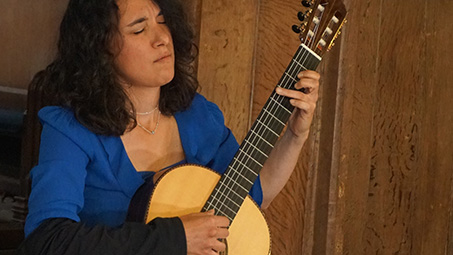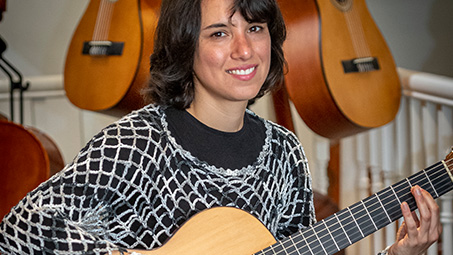
We look forward to Daniela Rossi making her debut at Turner Sims this month! Ahead of her performance on Saturday 11 February, we catch up with the classical guitarist over some Quick Questions.
LJ: What/who were your inspirations for first getting into music? How does pursuing a career in music differ between Argentina and England?
DANIELA: Although there are no professional musicians in my family, it was a very musical home. There was a piano which my three siblings used to play and my dad who is a very good amateur singer used to make us sing together (I am the youngest of four) and then I asked him to teach my my first chords at age 6. We used to listen to Argentinean folk music, tango and rock, primarily. Classical music came in later on.
I entered the music conservatoire age 11 and probably by the age of 14 I knew I would be a musician as a profession. I used to hear cassettes of John Williams and Eduardo Isaac, who became one of my most inspirational teachers in my teens and one of the people who encouraged me to make a career in Europe.
As I wanted to get into International Guitar Competitions and Concerts in Europe, where there is more activity for the classical guitarists, travelling from Argentina seemed difficult, so while it was not planned, I decided to stay on this side of the world and visit my family regularly.
LJ: One piece you are performing is Rossignol, written for you by Dušan himself. How did this come about and what was your reaction to one of your inspirations writing for you?
DANIELA: I am a fan of Dušan’s music since my teens, after hearing a recording of his Sonata by my former teacher, great Eduardo Isaac. I learned this piece and sent a video of it, produced by Siccas guitar, to Dušan, who, even though he did not know me whatsoever, was very kind to watch it and reply.
Some years later I met him at the Tarrega Guitar Competition where he was in the jury and I was a competitor. After the semi-final, he talked to me and asked why I did not play his Sonata, since I played his music very well. I was glad he remembered.
We continued to be in contact after this, and he surprised me, first by writing God Bless the Child, and then Rossignol, which might be one of my favourite pieces ever. I was thrilled and incredibly grateful someone like Dušan would dedicate a piece for me and that inspired me to work even harder.
LJ: Dušan admits that he wanted to help you with playing styles of blues and jazz. What differences did you discover when playing in styles other than classical, and is it easy to adapt into different genres?
DANIELA: It is actually not so easy to adapt into different genres. Dušan’s music is all written down, so while it has an improvisatory character such as the Passacaglia and the tempo is quite free, there is still the rigour of the classical.
However, I did listen to several jazz guitarists who helped me absorb the style, not only for Dušan’s music but also for Duarte’s music. I listened to a lot of Joe Pass, Django Reindhard of course, Wes Montgomery, Barney Kessel and others. I must admit it made me discover a new world, which I am still exploring.
Coming from Latin America, I did learn to play guitar by ear and played a lot of folk music. Although I consider myself strictly a classical musician, I can dip into other genres, perhaps, without the expertise.
LJ: You’ve studied with leading guitarists and teachers worldwide such as Eduardo Isaac and Graham Devine. What have you learnt from these experiences and how has it impacted your own performances?
DANIELA: Eduardo Isaac showed me a different approach to the guitar repertoire, as in his younger years he played all the standard repertoire (he also showed me the columns of the classical guitar repertoire in my teens on the summer courses I did with him, together with another 40 students from all of Latin America). In his concerts he would present works such as his own arrangement of Keith Jarret’s Koln Concerto or Bach’s French Suite No 2. This had, of course, a great impact on my later years and on finding my own identity as a performer.
Both Graham and Eduardo helped me with understanding different styles as I worked on repertoires that went from renaissance to contemporary with both of them, how to find a way of treating the guitar like an orchestra, how to refine your phrasing, how to be genuine in your playing and not trying to copy anyone.

LJ: What are you looking forward to most about performing in Southampton?
DANIELA: I look forward to performing in a beautiful city, to enjoy the acoustics of a great concert hall and to present a programme I strongly believe in to a new audience. I also look forward to playing the fabulous New Folias by Vincent Lindsey-Clark for the Maestro himself again, and for the great members of Southampton Guitar Society
Book your ticket to see Daniela Rossi on Saturday 11 February here
Comments are closed, but trackbacks and pingbacks are open.